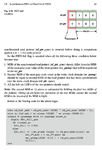promach
Advanced Member level 4
As in https://github.com/KastnerRG/riffa/blob/master/fpga/riffa_hdl/async_fifo.v#L76-L79 , could anyone advise on the differences in the context of purpose of the parameters ?
- - - Updated - - -
For lines 103 and 114 in the same verilog code, what is the semantic difference between EMPTY in async_cmp and RD_EMPTY in rd_ptr_empty ? Both are indirectly related by the signal wCmpEmpty.
- - - Updated - - -
Besides, does anyone have any clue why 'rCount < 2' as in https://github.com/KastnerRG/riffa/blob/master/fpga/riffa_hdl/async_fifo_fwft.v#L79 ?
wire [C_DEPTH_BITS-1:0] wWrPtr;
wire [C_DEPTH_BITS-1:0] wRdPtr;
wire [C_DEPTH_BITS-1:0] wWrPtrP1;
wire [C_DEPTH_BITS-1:0] wRdPtrP1;
Code Verilog - [expand]
- - - Updated - - -
For lines 103 and 114 in the same verilog code, what is the semantic difference between EMPTY in async_cmp and RD_EMPTY in rd_ptr_empty ? Both are indirectly related by the signal wCmpEmpty.
.EMPTY(wCmpEmpty),
.RD_EMPTY(RD_EMPTY),
- - - Updated - - -
Besides, does anyone have any clue why 'rCount < 2' as in https://github.com/KastnerRG/riffa/blob/master/fpga/riffa_hdl/async_fifo_fwft.v#L79 ?
wire wRen = RD_EN || (rCount < 2'd2);
Code Verilog - [expand]


